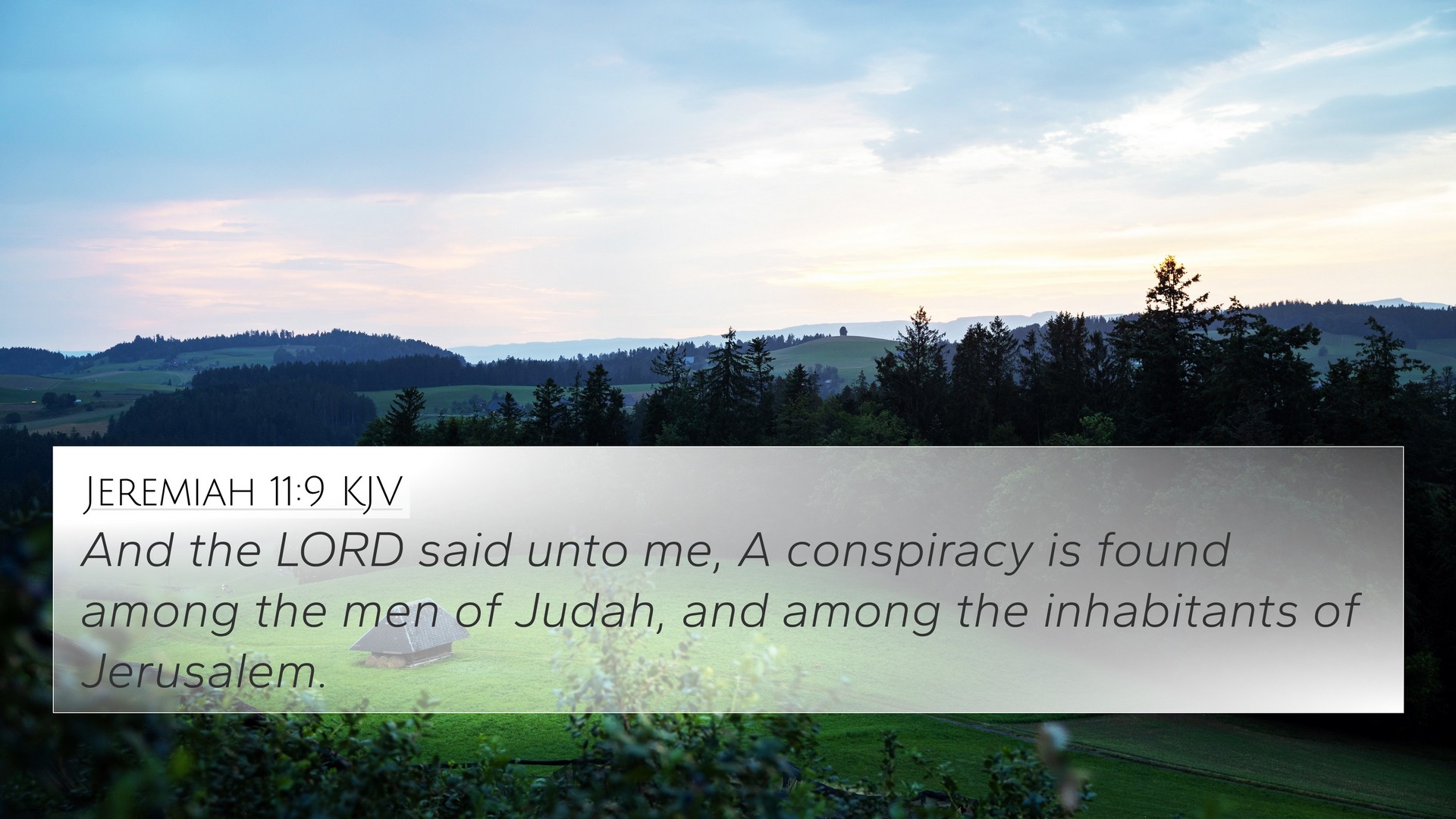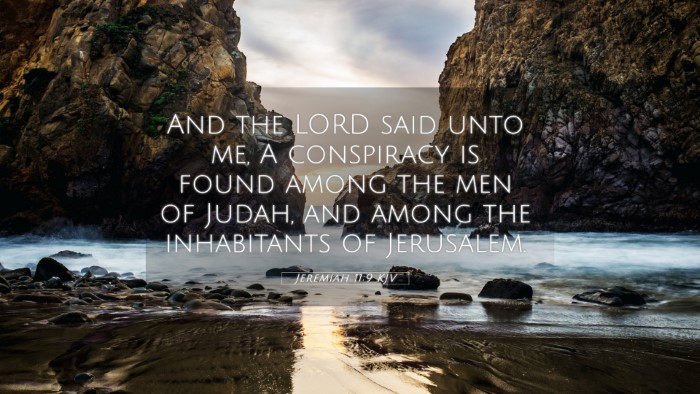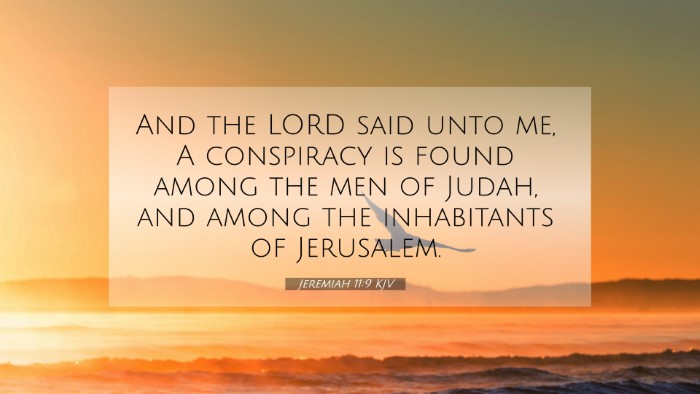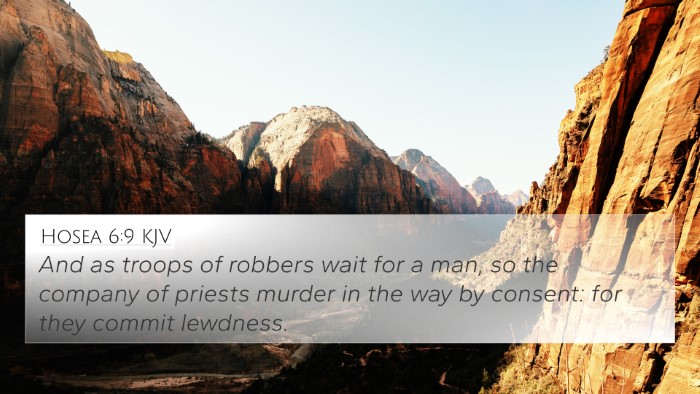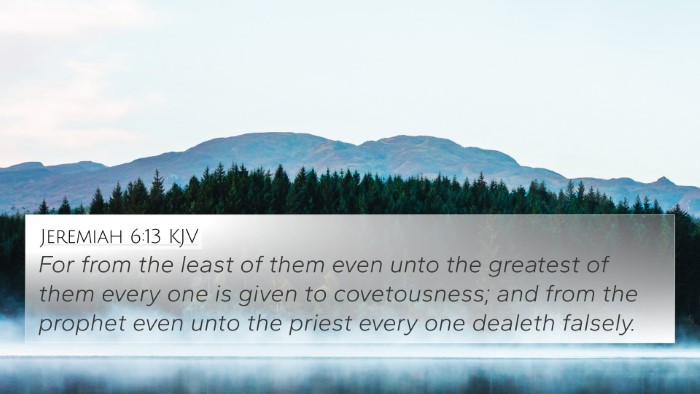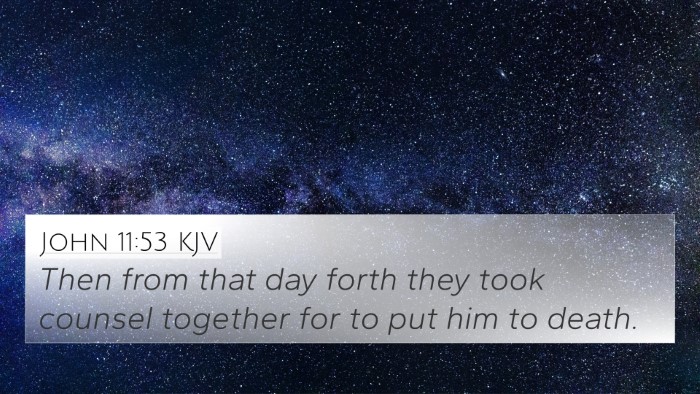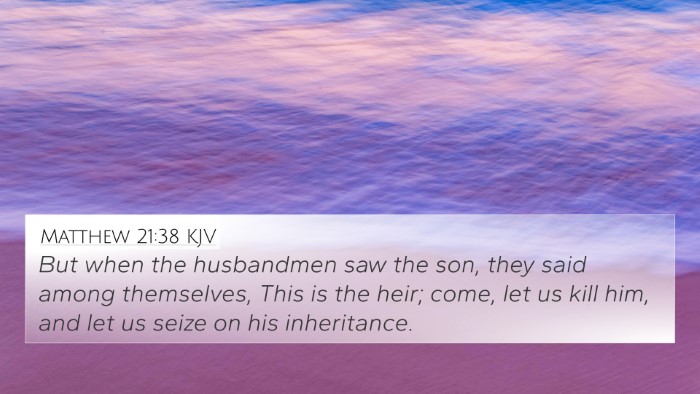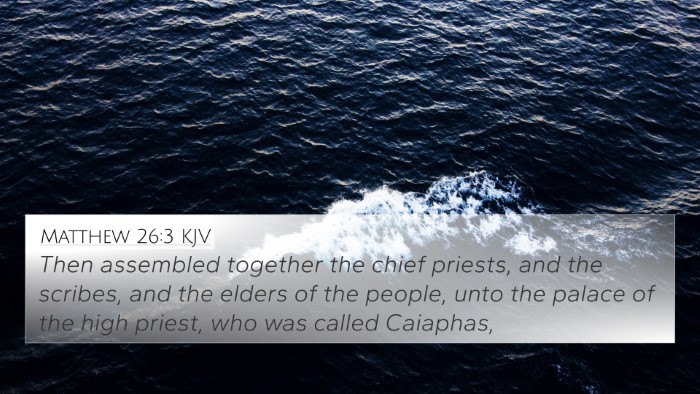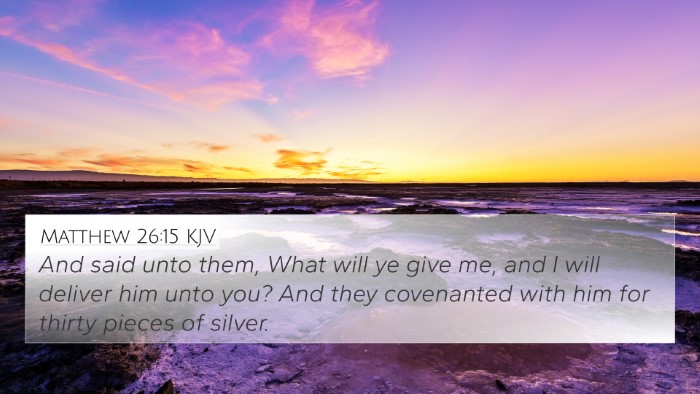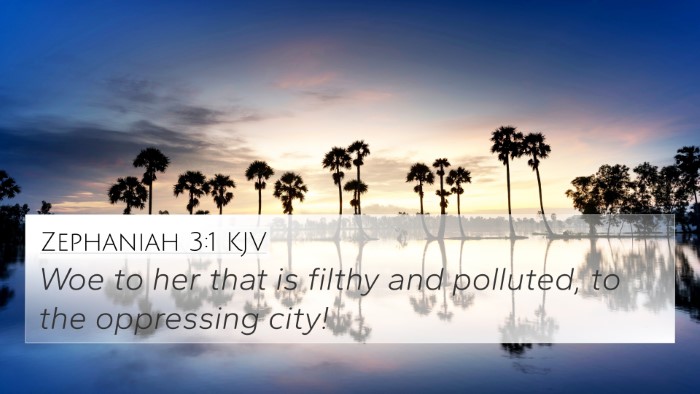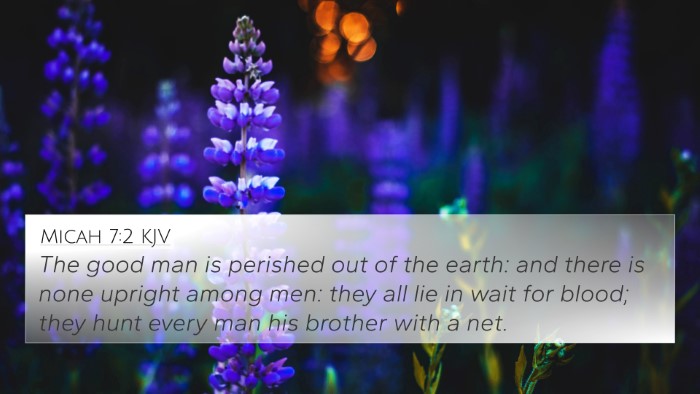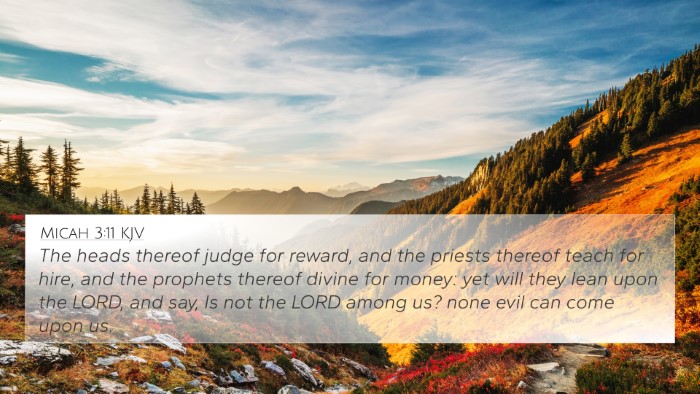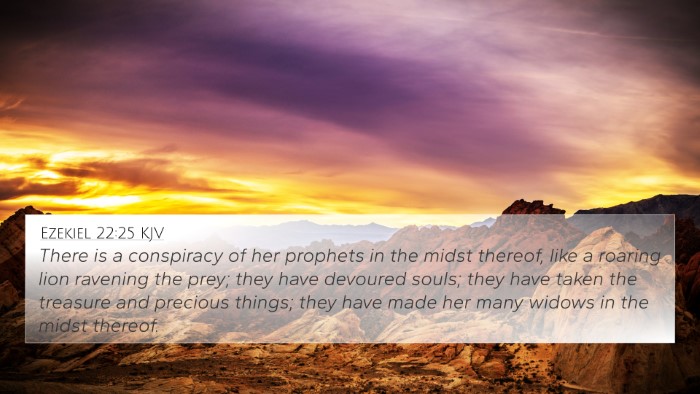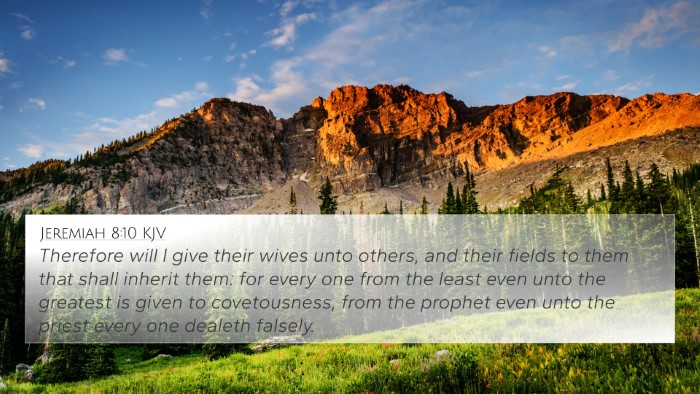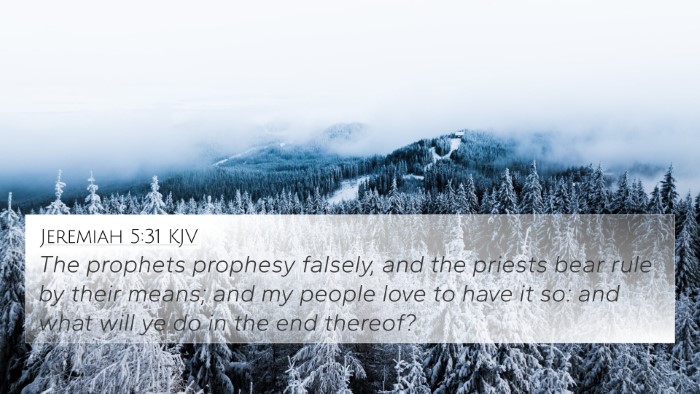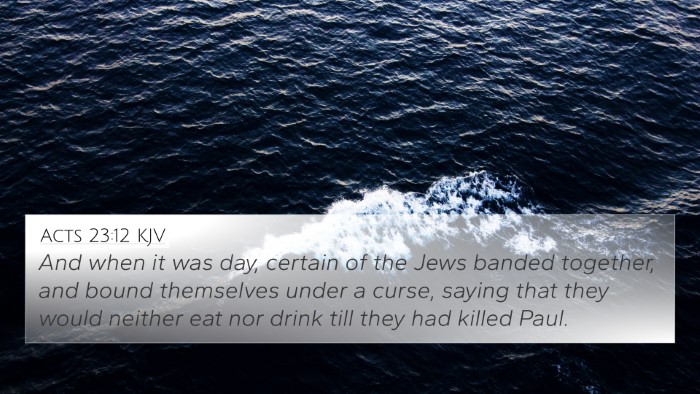Understanding Jeremiah 11:9
Jeremiah 11:9: "And the Lord said unto me, A conspiracy is found among the men of Judah, and among the inhabitants of Jerusalem."
Overview
Jeremiah 11:9 reveals God’s awareness of treachery among His people. The term "conspiracy" indicates a hidden, malicious plot against God's covenant and His messenger, the prophet Jeremiah. This verse marks the beginning of a significant section in the book of Jeremiah, emphasizing the people’s unfaithfulness and God's impending judgment.
Insights from Public Domain Commentaries
Matthew Henry's Commentary
Matthew Henry emphasizes the deceitful nature of Judah's inhabitants. He discusses how the betrayal signifies not only the individuals' disloyalty to the covenant but also a broader rejection of God's authority. The conspirators are not merely opposing a prophet; they are defying God Himself, demonstrating the seriousness of their sin.
Albert Barnes' Notes
Albert Barnes highlights the context of the verse, explaining that the "conspiracy" referenced could relate to the people plotting against Jeremiah and God's message. He indicates that this illustrates the larger issues of rebellion against God's law within Jerusalem and warns of the consequences that follow such actions. Barnes also notes the divine revelation of these conspiracies to Jeremiah, illustrating God's omniscience.
Adam Clarke's Commentary
Adam Clarke draws attention to the historical context, relating this verse to the social and religious conditions of Judah at the time. He suggests that this conspiracy reflects the deep-seated corruption influencing both leaders and the populace alike. Clarke stresses the theological implications, noting that God’s revelation of such schemes serves as a call to repentance and a reminder of the dire consequences of turning away from divine guidance.
Interconnections with Other Bible Verses
To deepen the understanding of Jeremiah 11:9, one can explore various cross-references that illustrate similar themes of conspiracy, rebellion, and divine revelation:
- Psalms 2:1-3: "Why do the nations conspire and the peoples plot in vain?" This verse echoes the idea of conspiracy against God’s appointed leaders.
- Lamentations 1:10: "The adversary has spread his hand over all her precious things; for she has seen the nations enter her sanctuary." This reflects the consequences of betrayal against God.
- Micah 2:1: "Woe to those who devise wickedness and work evil on their beds!" This highlights the sinful intentions of the conspirators.
- Isaiah 29:15: "Woe to those who go to great depths to hide their plans from the LORD." This speaks to the futility of plotting against God.
- Matthew 26:4: "And they plotted to arrest Jesus in some sly way and kill him." This New Testament passage connects the conspiracy themes underlined in Jeremiah.
- Acts 23:12: "The next morning some Jews formed a conspiracy and bound themselves with an oath not to eat or drink until they had killed Paul." This demonstrates the continuation of conspiratorial behavior within God’s people.
- Jeremiah 38:4: "Then the officials said to the king, 'This man should be put to death. He is discouraging the soldiers who are left in this city, as well as all the people.'" The conspiracies against the prophets are seen throughout Jeremiah’s life.
Thematic Connections and Analysis
The theme of conspiracy against God's messengers is prevalent throughout the Bible, seen both in the Old Testament and fulfilled in the New Testament. In understanding Jeremiah 11:9, one can link it to:
- Disloyalty to God: The betrayal by the people of Judah represents a deeper spiritual failure to uphold the covenant.
- Divine Sovereignty: God’s knowledge of human conspiracies emphasizes His ultimate authority over human affairs.
- Call to Repentance: The acknowledgment of sin prompts the need for repentance—a theme that is essential in both Jeremiah’s ministry and Jesus’ teachings.
Conclusion
Jeremiah 11:9 serves as a stark reminder of the treachery that can arise among God's people but also highlights God's continuous awareness and ultimate control over the unfolding events. Through comparative Bible verse analysis, one can see the continuity of themes throughout Scripture, showcasing the nature of humanity's rebellion against divine will.
Further Study Tools
For those wishing to explore the connections between Bible verses further, a variety of tools for Bible cross-referencing can enhance understanding:
- Bible concordance: Enables users to find specific words and themes.
- Bible cross-reference guide: Highlights related verses for deeper study.
- Cross-reference Bible study: A method to explore themes across different books of the Bible.
As you delve deeper, remember the importance of identifying connections between the Old and New Testament to enrich your study of Scripture and its profound messages.
